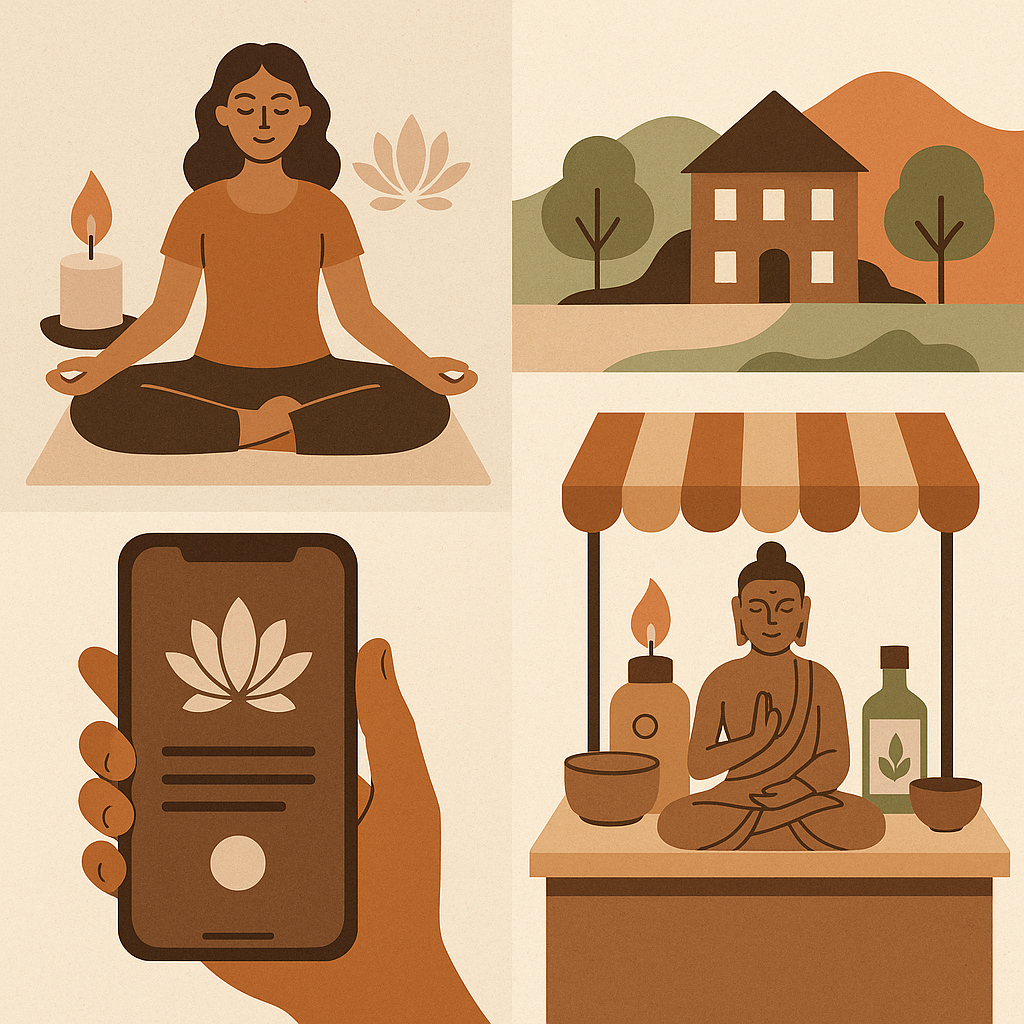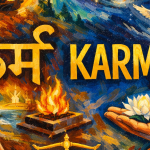The Business of Spirituality: Wellness, Retreats, Apps & Commodification
In recent years, spirituality has quietly become one of the fastest-growing industries in the world. What was once a deeply personal journey of introspection and faith has now expanded into a global marketplace — complete with meditation apps, yoga retreats, mindfulness workshops, and spiritual influencers. In India, where ancient traditions of meditation and self-realization originated, spirituality has been rebranded and commercialized to fit modern lifestyles. The business of spirituality now straddles the line between authentic self-growth and consumer-driven commodification.
The Rise of the Spiritual Economy
The modern spiritual economy thrives on a global appetite for mental peace and emotional balance. In an age of digital stress, people are turning to meditation, yoga, and alternative healing as antidotes to burnout. Spirituality has become not only a belief system but also a lifestyle choice — one that can be subscribed to, downloaded, and purchased.
India, with its heritage of gurus, ashrams, and scriptures, has become the epicenter of this commercial awakening. Wellness tourism, meditation retreats, and yoga teacher training programs attract millions of visitors every year. From the ashrams of Rishikesh to luxury retreats in Kerala, spiritual experience now comes with tiered pricing, packages, and online booking options. What once required years of discipline and guidance can now be accessed in a weekend — for a fee.
Wellness as a Commodity
The modern wellness movement, though rooted in spiritual ideas, has increasingly taken on a commercial character. Yoga, originally a path of self-realization, has been transformed into a fitness brand with global franchises, apparel lines, and influencer-driven marketing. Ayurveda, once practiced as a holistic medical science, is now packaged as luxury skincare or detox therapy.
This commodification raises ethical questions. When spirituality becomes a product, does it lose its essence? The original intent of practices like yoga or meditation — inner transformation and detachment — stands in contrast to the consumer mindset that seeks immediate results. The paradox of paying for “non-attachment” is at the heart of the modern spiritual business.
The Appification of Inner Peace
Technology has revolutionized the spiritual landscape. Meditation and mindfulness apps such as Calm, Headspace, and India’s own Sattva or Art of Living apps have brought guided spirituality to millions of smartphones. Users can meditate with a celebrity voice, track their progress, and even compete for daily streaks — gamifying what was once a purely inward act.
In India, hundreds of new apps now offer astrology readings, mantra recitations, or virtual satsangs. Temples allow online donations and e-darshan, and spiritual leaders stream discourses live to global audiences. While this digitization has made spirituality more accessible, it also turns it into a convenience product. Faith, which traditionally required discipline and surrender, is now filtered through screens, algorithms, and monetization models.
The danger lies in reducing deep spiritual experiences to “content.” When meditation becomes a subscription and peace becomes a brand, spirituality risks being measured in downloads rather than devotion.
Retreats and the Luxury of Enlightenment
The rise of wellness retreats across India reflects the merging of spirituality with tourism and luxury. Destinations like Goa, Rishikesh, Dharamshala, and Coorg now host high-end resorts offering silent retreats, yoga detoxes, and “soul reset” vacations. The clientele often includes urban professionals and global travelers seeking relief from stress or purpose in fast-paced lives.
These retreats often combine ancient Indian practices with Western wellness trends — aromatherapy, vegan meals, and mindfulness workshops. While many offer genuine healing and reflection, others cater more to lifestyle branding than spiritual depth. The commercialization of ashrams into resorts blurs the distinction between spiritual practice and leisure consumption.
At the same time, such spaces have created jobs, promoted eco-friendly tourism, and revived interest in Indian traditions. The question, however, remains whether spirituality should be marketed like a spa experience or preserved as a sacred discipline.
The Guru as a Brand
In the business of spirituality, spiritual leaders themselves have become brands. Modern gurus often manage vast organizations, publish books, and command millions of followers on social media. Their teachings, once spread through word of mouth, now reach audiences through podcasts, apps, and merchandise.
This visibility can democratize access to wisdom, but it can also blur the line between authenticity and marketing. When gurus endorse products or align with political and corporate interests, their spiritual authority risks being diluted. The shift from guru-shishya parampara (teacher-disciple tradition) to influencer culture reflects how the sacred has adapted — and sometimes surrendered — to the commercial world.
Finding Balance Between Profit and Purpose
Despite its commercialization, the spiritual business has brought certain positive outcomes. It has helped normalize conversations around mental health, mindfulness, and ethical living. It has created livelihoods for yoga teachers, artisans, and wellness practitioners. Most importantly, it has made ancient Indian wisdom accessible to new generations.
The challenge is to retain authenticity while embracing innovation. Ethical spirituality requires transparency, respect for cultural origins, and a clear boundary between teaching and selling. True spiritual progress cannot be mass-produced; it grows through sincerity, discipline, and humility.
The Price of Peace
The business of spirituality mirrors the contradictions of modern life — the search for inner calm in an age of outer noise. As wellness becomes an industry and meditation a trend, we must ask whether we are consuming spirituality or truly living it. The answer lies in intention: if commerce supports genuine transformation, it can coexist with spiritual integrity. But if profit replaces purpose, the sacred becomes just another commodity.
India, the birthplace of some of the world’s deepest spiritual traditions, stands at a crossroads — between heritage and hype, between mindfulness and marketing. The true challenge ahead is not to reject the business of spirituality, but to humanize it — ensuring that behind every app, retreat, or brand lies an authentic call to awaken the self.
~Religion World Bureau










